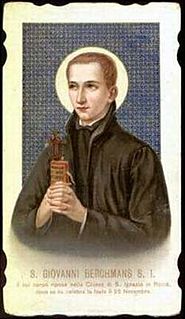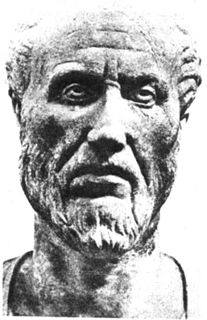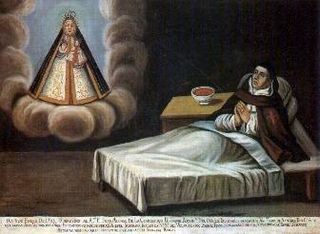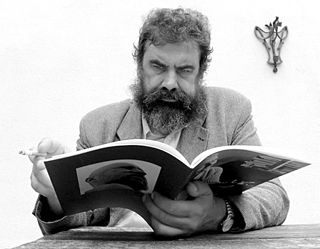Related Research Articles
Aedesius was a Neoplatonist philosopher and mystic born of a noble Cappadocian family.

Pythagoras of Samos was an ancient Ionian Greek philosopher and the eponymous founder of Pythagoreanism. His political and religious teachings were well known in Magna Graecia and influenced the philosophies of Plato, Aristotle, and, through them, Western philosophy. Knowledge of his life is clouded by legend, but he appears to have been the son of Mnesarchus, a gem-engraver on the island of Samos. Modern scholars disagree regarding Pythagoras's education and influences, but they do agree that, around 530 BC, he travelled to Croton, in what is now southern Italy, where he founded a school in which initiates were sworn to secrecy and lived a communal, ascetic lifestyle. This lifestyle entailed a number of dietary prohibitions, traditionally said to have included vegetarianism, although modern scholars doubt that he ever advocated for complete vegetarianism.

Plotinus was a major Hellenistic philosopher who lived in Roman Egypt. In his philosophy, described in the Enneads, there are three principles: the One, the Intellect, and the Soul. His teacher was Ammonius Saccas, who was of the Platonic tradition. Historians of the 19th century invented the term Neoplatonism and applied it to Plotinus and his philosophy, which was influential during Late Antiquity and the Middle Ages. Much of the biographical information about Plotinus comes from Porphyry's preface to his edition of Plotinus' Enneads. His metaphysical writings have inspired centuries of Pagan, Jewish, Christian, Gnostic, and Islamic metaphysicians and mystics, including developing precepts that influence mainstream theological concepts within religions, such as his work on duality of the One in two metaphysical states. This concept is similar to the Christian notion of Jesus being both god and man, a foundational idea in Christian theology.
Nicomachus of Gerasa was an important ancient mathematician best known for his works Introduction to Arithmetic and Manual of Harmonics in Greek. He was born in Gerasa, in the Roman province of Syria, and was strongly influenced by Aristotle. He was a Neopythagorean, who wrote about the mystical properties of numbers.

Iamblichus was a Syrian Neoplatonist philosopher of Arab origin. He determined the direction that would later be taken by Neoplatonic philosophy. He was also the biographer of the Greek mystic, philosopher and mathematician Pythagoras,
Leonard George is a Canadian psychologist and schizophrenia researcher based in Vancouver, British Columbia, best known for his writing and lectures on varieties of anomalous phenomena, spirituality, psychology and history. In the 1990s he was a noted broadcaster in Canada, appearing on radio and television in that country and in the United States where he appeared on national programs such as a highly rated NBC special hosted by actor Peter Graves in October 1994.

Porphyry of Tyre was a Neoplatonic philosopher born in Tyre during Roman rule. He edited and published The Enneads, the only collection of the work of Plotinus, his teacher. His commentary on Euclid's Elements was used as a source by Pappus of Alexandria.
Sallustius or Sallust was a 4th-century writer, a friend of the Roman Emperor Julian. He wrote the treatise On the Gods and the Cosmos, a kind of catechism of 4th-century Hellenic paganism.

Saint John Berchmans, SJ was a Jesuit scholastic and is a saint in the Catholic Church. He is the patron saint of altar servers.

Platonism is the philosophy of Plato and philosophical systems closely derived from it, though contemporary platonists do not necessarily accept all of the doctrines of Plato. Platonism had a profound effect on Western thought. Platonism at least affirms the existence of abstract objects, which are asserted to exist in a third realm distinct from both the sensible external world and from the internal world of consciousness, and is the opposite of nominalism. This can apply to properties, types, propositions, meanings, numbers, sets, truth values, and so on. Philosophers who affirm the existence of abstract objects are sometimes called platonists; those who deny their existence are sometimes called nominalists. The terms "platonism" and "nominalism" also have established senses in the history of philosophy, where they denote positions that have little to do with the modern notion of an abstract object.

Gnosticism refers to a collection of religious groups originating in Jewish religiosity in Alexandria in the first few centuries CE. Neoplatonism is a school of Hellenistic philosophy that took shape in the 3rd century, based on the teachings of Plato and some of his early followers. While Gnosticism was influenced by Middle Platonism, neo-Platonists from the third century onward rejected Gnosticism.
Arthur Hilary Armstrong, was an English educator and author. Armstrong is recognized as one of the foremost authorities on the philosophical teachings of Plotinus ca. 205–270 CE. His multi-volume translation of the philosopher's teachings is regarded as an essential tool of classical studies.

Schools of the Sacred Heart is a complex of two Roman Catholic single-sex private schools for grades Pre-Kindergarten-3 through grade twelve in Grand Coteau, Louisiana.

Henosis is the classical Greek word for mystical "oneness", "union" or "unity." In Platonism, and especially Neoplatonism, the goal of henosis is union with what is fundamental in reality: the One, the Source, or Monad. The Neoplatonic concept has precedents in the Greek mystery religions as well as parallels in Eastern philosophy. It is further developed in the Corpus Hermeticum, in Christian theology, Alevism, soteriology and mysticism, and is an important factor in the historical development of monotheism during Late Antiquity.
Hellenistic philosophy is the period of Western philosophy and Middle Eastern philosophy that was developed in the Hellenistic period following Aristotle and ending with the beginning of Neoplatonism.
John Myles Dillon is an Irish classicist and philosopher who was Regius Professor of Greek in Trinity College, Dublin between 1980 and 2006. Prior to that he taught at the University of California, Berkeley. He was elected a corresponding member of the Academy of Athens on 15 June 2010. Dillon's area of research lies in the history of Platonism from the Old Academy to the Renaissance, and also Early Christianity.
Platonism, especially in its Neoplatonist form, underwent a revival in the Renaissance, as part of a general revival of interest in Classical antiquity. Interest in Platonism was especially strong in Florence under the Medici.

Neoplatonism is a strand of Platonic philosophy that emerged in the third century AD against the background of Hellenistic philosophy and religion. The term does not encapsulate a set of ideas as much as it encapsulates a chain of thinkers which began with Ammonius Saccas and his student Plotinus and which stretches to the sixth century AD. Even though neoplatonism primarily circumscribes the thinkers who are now labeled Neoplatonists and not their ideas, there are some ideas that are common to neoplatonic systems, for example, the monistic idea that all of reality can be derived from a single principle, "the One".

Algis Uždavinys (1962–2010) was a prolific Lithuanian philosopher and scholar. His work pioneered the hermeneutical comparative study of Egyptian and Greek religions, especially their esoteric relations to Semitic religions, and in particular the inner aspect of Islam (Sufism). His books have been published in Lithuanian, Russian, English and French, including translations of Plotinus, Frithjof Schuon and Ananda Coomaraswamy into Russian and Lithuanian.

The International Journal of the Platonic Tradition is a biannual peer-reviewed open access academic journal of philosophy published by Brill Publishers under the auspices of the International Society for Neoplatonic Studies. It was established in 1985 and the editor-in-chief is John F. Finamore. The journal is abstracted and indexed in the Humanities International Index, International Review of Biblical Studies, and Scopus.
References
- ↑ "John F. Finamore". The University of Iowa.